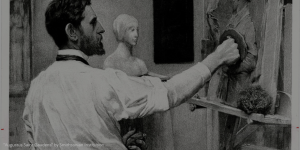The main goal of all creative people is to be productive: to produce works. Their work schedule and environment are  designed to facilitate production because production is their reason for being. Everything—all your education and training, habits, dreams and hopes, and all your routines and rituals are aimed at that one central goal: getting good work out; being able to produce. If a writer or artist is being productive she’s happy. If she’s not, she’s unhappy.
designed to facilitate production because production is their reason for being. Everything—all your education and training, habits, dreams and hopes, and all your routines and rituals are aimed at that one central goal: getting good work out; being able to produce. If a writer or artist is being productive she’s happy. If she’s not, she’s unhappy.
I rise fully awake, my mind sharp, at 4:00 A.M. Then I turn on music and putter around in the kitchen. I’m purposely delaying starting to work so ideas will start germinating, straightening themselves out, and working themselves to my consciousness. Waking or sleeping, night or day, conscious or unconscious, writers’ and artists’ minds continue without stop to produce ideas relevant to their work.
I have a bowl of Cheerios and make my wife’s breakfast. In the winter I go out and shovel snow. (This is, after all, Chicago.) I may throw a snowball at my wife and I may load or empty the dishwasher and put in a load of laundry in the basement. I avoid knowing anything about the news, bills, problems, troubles, and other practical matters that are  unrelated to my work. I kiss my wife good-bye as she goes off to work or wherever she’s going.
unrelated to my work. I kiss my wife good-bye as she goes off to work or wherever she’s going.
In my mid-twenties I was hired by a university think tank of psychologists and economists to rewrite for publication a book from a draft they had written. My main job was to translate all the pretentious academic mumbo-jumbo of their version into clear concepts and language the general reader would have no problem understanding. One day I was at the institute in Ann Arbor, Michigan, my feet up on a window sill, gazing out at ducks on a pond. I was paying no attention to the stacks of books, research periodicals, and reams of data surrounding me. The director of the institute poked his head in and said, nervously, “When are you going to get started, Dave? We’ve got to get the thing to the printer.” And I said, “I’ve already started. I’m working right now.” What I meant was that I was deep in what I call “Pre-Compositional Lilt.” It’s a very pleasant mental aimlessness—a lilting–that most creative people need to engage in before they tackle a project—a ritualistic, nebulous, uncertain, dream state.
In the article “Write Before Writing” Pulitzer Prize author Donald M. Murray is really talking about my lilt, and my lilt affects artists and writers as well as inventors and scientists—creators generally. He says that resistance to writing is not something to be avoided, but “is one of the great natural forces of nature. It may be called The Law of Delay: that writing which may be delayed, will be. Dawdling, going on errands, sharpening well-pointed pencils, rearranging the writing space, wandering to libraries and book stores, going for walks, and driving around serve a purpose.” Murray adds, “Teachers and writers too often consider resistance to writing evil when in fact it is necessary…There must be time for the seed of an idea to be nurtured in the mind.” Murray says writers who delay starting are trying not to think about what they are going to write so they can think subconsciously about it first. Most writers are strong believers in putting their subconscious to work.
I go upstairs to my work room and listen to You Tube for a few songs—always the same songs, same performers—while shuffling mindlessly through my piles of notes, and checking the ten-day weather forecast, and last night’s scores, also drinking a large mug of coffee that isn’t too strong. I try never to write for an hour after eating. I don’t want brain oxygen that I save for writing to be worried about digestion.
It’s commonplace for creative people to nap at least once during the day, sometimes more, and that’s highly  recommended by psychologists who study creative achievement. Who was more creative than Thomas Edison (1,093 patents)? And he alternated work and naps throughout the day. He napped under a table in his lab. I take a short nap on the living room couch. All the while everything else is going on I know my mind is busy toying with a problem I set for it the night before, or a minutes before, such as, “How will I organize the section on…” or “Should I cut the last paragraph as so-and-so suggests?” Ideally writers and artists work in the same place every day, a place that is exclusively for work.
recommended by psychologists who study creative achievement. Who was more creative than Thomas Edison (1,093 patents)? And he alternated work and naps throughout the day. He napped under a table in his lab. I take a short nap on the living room couch. All the while everything else is going on I know my mind is busy toying with a problem I set for it the night before, or a minutes before, such as, “How will I organize the section on…” or “Should I cut the last paragraph as so-and-so suggests?” Ideally writers and artists work in the same place every day, a place that is exclusively for work.
I’m now in my element, fully confident, contented, primed and ready to write. Then I plunge into work and follow Ernest Hemingway’s advice and review what I wrote the day before, editing a little, expanding, embellishing a little—a word here, a phrase there–till I get a feel for the rhythms of written words, am able to fit myself into the narrative flow, and stimulate the right vocabulary. I’ve transitioned and am now in a goal-focused state. This is when—when the actual work begins—that you mustn’t allow the Law of Delay to be in effect any longer. What do you have when the Law of Delay becomes a habit? Writers who make a career of delay, whose promise will not be fulfilled, whose talent goes to waste, whose books go unwritten.
I take no phone calls during the day unless from a member of my immediate family, make only essential calls (as to my wife at noon), and generally skip lunch or have a small container of yogurt. If I’m being very productive—“making good progress” in my lingo–I can easily feel an excitement which can get out of control and make me lose focus and write sloppily. I try never to be so relaxed that my writing isn’t crisp, but aim for a degree of alert tension.
To “settle down” from an excited state I may take time out to whip up a salad for dinner later and tell myself, “No more coffee today.” And I may do deep abdominal relaxation breathing. Broadway composer Cole Porter had an alarm clock rigged to ring every fifty minutes when he was composing. Then he took a ten minute break. William Faulkner wrote rapidly at top speed as fast as he could type for a half hour or so and then would relax for perhaps another half hour, talking or reading, and return again and type at the same breakneck speed, sometimes picking up in mid-sentence and continuing without any hesitation. I may work the entire day without a break except the bathroom.
I try never, never to do any writing after 4:00 p.m., and certainly don’t do any after six, unless a deadline tells me I have  to, for if I did, words, ideas, and plans would fly through my mind like missiles and I would not—would not, absolutely would not—would not be able to sleep that night. Tell me, is it possible to be a writer without also being an insomniac?
to, for if I did, words, ideas, and plans would fly through my mind like missiles and I would not—would not, absolutely would not—would not be able to sleep that night. Tell me, is it possible to be a writer without also being an insomniac?
Between four and five is “reading time,” which is essential—a hunger. The kind of reading depends on the reason for my reading: non-fiction research reading involves close concentration and taking extensive notes. For best results I must sit at the dining room table (in a particular place at the table) with notebooks and black ink Pilot G-2 07 pens. Fiction reading can be done in an easy chair or on the couch while a baseball or hockey game is played on the television screen. I read fiction more for its style than its content.
Then my wife appears and asks, “How was your day? Were you productive?”
© 2015 David J. Rogers
For my interview from the international teleconference with Ben Dean about Fighting to Win, click on the following link:
Order Fighting to Win: Samurai Techniques for Your Work and Life eBook by David J. Rogers
or
Order Waging Business Warfare: Lessons From the Military Masters in Achieving Competitive Superiority
or

